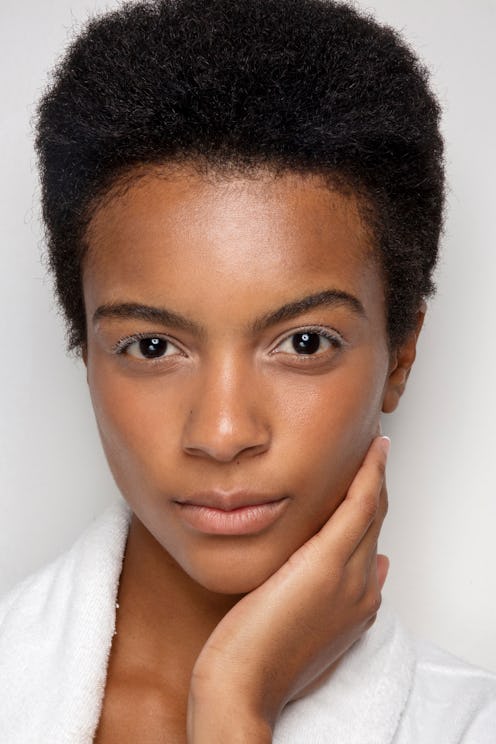(Beauty)
Should You See A Dermatologist Or An Esthetician?

The plight of struggling with skin ailments can be draining enough. To make matters worse, many times you're tasked with figuring out whether you're simply in need of a quick facial to reset the skin, or if there's a more serious condition going on. To determine that, however, requires seeking out the right expert. That's why, understanding the differences between a dermatologist and esthetician can be key to resolving skincare issues.
With less access these days to dermatologist offices, estheticians, who have taken their expertise to social media, are garnering celebrity status in their own right. Sean Garrette, an esthetician with nearly 125,000 social media followers combined, was just named global ambassador for Fenty Skin. And Tiara Willis, New York City esthetician and founder of social media platform Makeup For Women Of Color, has a loyal following of more than 400,000 skincare loyalists all relying on her expertise.
However, while Garrette and Willis are definitely skincare experts, they're not dermatologists. In fact, their levels of expertise are in many ways vastly different. The number one factor differentiating the two is the medical qualifications. "An esthetician is a licensed beautician who services simple skin maintenance needs versus medical and surgical needs," Dr. Harold Lancer, Beverly Hills dermatologist and founder of Lancer Skincare says. That said, when it comes to more severe skin conditions, an esthetician may not be able to properly treat, nor diagnose the effects.
But how do you know when your skin is in need of medical attention versus a simple facial? Ahead, check out all the multiple factors that set estheticians and dermatologists apart, and how the two professions are often interconnected.
The Difference Between Dermatologists & Estheticians: What Is A Dermatologist?
"A dermatologist is a physician and surgeon with specialty training in skin, hair and nails," Dr. Lancer says. "About 20 percent of my patient base comes to see me for medical needs such as the treatment and management of infections and inflammation, as well as the diagnosis of important medical or surgical issues. Another 20 percent of my patient base comes to see me for the medical and surgical management of a variety of skin tumors, both cancerous and non-cancerous." Dr. Lancer also administers and array of laser treatments as well as unknown skincare diagnosis. "Much of my patient base comes to see me for the true diagnosis and management of cosmetic concerns such as neuromodulators and volume replacement," he says.
The Difference Between Dermatologists & Estheticians: What Is An Esthetician?
Estheticians are not medically certified, therefore their scope of work is restricted to treating the skin's appearance. "Legally, estheticians in most states are allowed to do facials," Willis tells TZR. "When you go to esthetician school, you can pursue other specialties within that license such as work with lasers. I, personally, mostly work with clients with acne and hyperpigmentation. That said, I do a lot of chemical peels and cleanings."
However, similar to a dermatologist, estheticians also put their clients on regimens. "I, too, recommend that every one should get a facial once a month or, at least, once every three months," she says. "Most of my clients have a type of goal they're trying reach. Generally with their acne."
The Difference Between Dermatologists & Estheticians: How To Decide Which One Is For You
"See a dermatologist for all medical opinions and therapies," Dr. Lancer says. And Willis agrees, sharing that she sometimes will refer a client to a dermatologist if she feels what they need is beyond what she's qualified to treat. "If I'm doing laser especially, I always look out for moles because sometimes growths like that be cancerous," she says. "So I'll advise my clients to see a dermatologist if ever there's a growth or a suspicious mole or anything I'm not trained to diagnose." She also adopts that attitude for many skin conditions. "Skin ailments like eczema are often best treated by a dermatologist," she says.
However, Willis believes that utilizing both experts can be beneficial to the skin. "There's no need to pit dermatologist and estheticians against each other," she says. "Both can be extremely helpful if utilized the right way. You'll also find that in a lot of med-spas and dermatologist offices they'll hire estheticians on staff. So the dermatologist will diagnose and prescribe, and then esthetician may be there just to lend advice and their expertise in support of the doctor."
The Difference Between Dermatologists & Estheticians: Writing Prescriptions
"Unlike estheticians, dermatologists can prescribe medicated skincare products such as Tretinoin, topical steroids, and oral treatments such as Accutane," Willis says. For her clients that have been prescribed skin aids of the sort, she insists that her job is to simply make sure they stay on track. "My goal is to really support the health of their skin while they're using those prescriptions."
Luckily, dermatologists like Dr. Lancer have created skincare lines of their own expertise that don't require prescriptions. "A dermatology-trained doctor who develops a skincare brand does it due to an understanding of the true mechanism behind skin illnesses, biology and chemistry," he says. "This science and education is critically important as it serves as the difference between temporary and longterm skin repair and skin health benefits."
The Difference Between Dermatologists & Estheticians: Virtual Appointments During COVID-19
Both Dr. Lancer and Willis have continued to see their clients during quarantine. "It is extremely important to continue seeing a dermatologist, even virtually, because virtual consultations are designed to manage urgent medical and surgical questions when a patient cannot physically make it into a medical facility," Dr. Lancer says. "This acts as a triage until the person can make it into the office for in-depth treatment. Skipping this step and solely seeing an esthetician leaves room for the potential failure to understand the reason for certain skin issues."
This article was originally published on